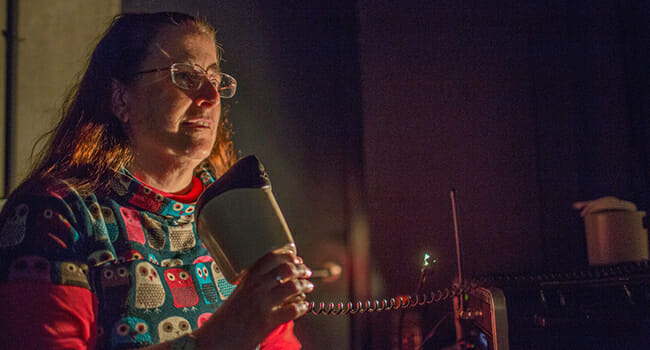Volunteer Reader Brings the Theatre to Life for Visually Impaired Patrons


Courtesy: Dayna Smith/The Washington Post
Rita Tehan describing the play “All the Way” at Arena Stage.
As the theater lights dim, music turns on and actors start moving onto the stage, most audience members would fix their eyes onto the stage. But the blind or visually-impaired patrons don’t fix their eyes on the stage. Rather, they focus their ears on their headphones to listen to Rita Tehan’s voice describing everything happening onstage.
Rita, 59, of Washington, D.C., is a longtime volunteer at the Metropolitan Washington Ear, a nonprofit organization that provides free theater descriptions, newspaper readings and other audio services for the blind and visually impaired.
This is Rita’s 25th year volunteering with the Metropolitan Washington Ear, but her experience with describing started in her teenage years.
“My father was blind,” Rita said. “He became blind when I was 14 and so, just on my own, watching TV, I would describe what had just happened. He appreciated that.”
Just as her father appreciated her service, Rita knows that the blind patrons she now describes for also appreciate her service. Many people come to her after the show to thank her.
“I got a comment a number of times, that they appreciate knowing why the audience is laughing because it’s usually a visual thing and that really helps them,” Rita said.
Before describing a performance, Rita previews every show at least twice and takes notes of every action that needs to be described. Sighted people might not particularly think about how close the actors are to each other or how their bodies are positioned, but for the blind and visually impaired, every detail is important to understand what is going on in the scene.
Rita and the Metropolitan Washington Ear try to give the blind and visually impaired patrons as much of a similar experience as a sighted audience member would have. This includes having them make their own assumptions.
“You can’t say that somebody is angry or happy or sad,” Rita said. “You have to describe what their face is doing and so if somebody is sad, you say that maybe their brow is furrowed and their head bowed and their mouth is dropping. That kind of thing because we can’t assume. Just because we think the character is happy, we can’t say that.”
Rita has no plans of stopping and said that as long as the Metropolitan Washington Ear exists, she will keep volunteering.
“Being blind is hard enough,” Rita said. “So if you have anything that can help ease that and make any aspect of your life more accessible, I think that’s a good thing.”
If you are inspired by Rita’s story of service and would like to help people who are blind or have a disability, search All for Good for volunteer opportunities in your area.
